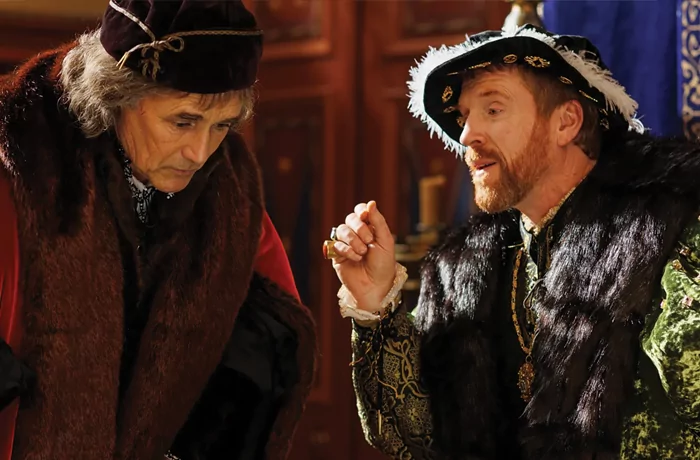Some historical fiction is uncontroversial because it presents the past merely as a backdrop for a story that does not suggest new facts or challenge widely accepted interpretations. Other successful creations go the other way, dispensing with the truth so brazenly that they render caveats fatuous because their narratives aren’t so much revisionist history as counterfactual fantasy. Only a pedant could object to Quentin Tarantino changing the course of World War II in Inglourious Basterds to tell a story of Jewish commandos assassinating Hitler in a French movie theater.
In between these extremes, however, are works that invite controversy by treating history in minute detail and yet, without comedy or even an ironic wink at the audience, they seek to overturn what everybody thought they knew. This is what Hilary Mantel did brilliantly in her Wolf Hall trilogy about Thomas Cromwell, a figure central to the religious and dynastic upheavals of 16th-century England, who influenced the nation’s subsequent 500 years of history. The last volume of the trilogy was published in 2020, two years before Mantel’s death, and has now, like the second novel, been adapted triumphantly into a television series jointly produced by PBS Masterpiece and the BBC, Wolf Hall: The Mirror and the Light.
It is a measure of the original work’s quality and its excellent adaptation to television that historical revisionism remains central to any discussion of its merits; if they were less good, no one would care whether they were true or not. And the TV series pushes revision even further than the novel, making Cromwell not just a sympathetic if ambiguous figure but a true tragic hero. There is a degree of wish fulfillment in this on the part of the strongly anti-Catholic (and former Catholic) Mantel, not wholly removed from the startling inventions of Tarantino.

Cromwell was a blacksmith’s son who rose in the court of Henry VIII by taking decisive, often ruthless, and previously unthinkable action to turn a violently capricious king’s desires into reality. He engineered the trial and execution of Henry’s second queen, Anne Boleyn, the mother of the future Elizabeth I, enacted the break from the Church of Rome, and was instrumental in creating the Church of England. Mirror, with Mark Rylance starring again magnificently in the role of Cromwell, captures the enormity of these events as they shatter Christendom and raise matters of life and death not just in the protagonists’ temporal existence but also in eternity.
Cromwell has traditionally been regarded as a calculating and brutal creature, amorally Machiavellian to the very nerve endings of his blunt fingertips. He enriched and advanced himself by framing enemies (both the king’s and his own) for crimes they did not commit. He tortured adversaries. He smashed and plundered thousands of religious houses.
This black view of him was prevalent long before it was emphasized by the splendid 1966 film, A Man for All Seasons, adapted from the play and BBC radio series by Robert Bolt, in which Paul Scofield played the lead role of Sir Thomas More (canonized by the Catholic Church in 1935). Cromwell, using perjury among other things, prosecuted More in a process that led to the axman’s block on Tower Hil. But Mirror makes Cromwell an entirely engaging figure, emotionally vulnerable and morally anxious. He weeps at the thought that his first mentor, Cardinal Wolsey, might have died thinking him guilty of betrayal, and might indeed have been right to do so. For despite his scheming, Cromwell prizes loyalty, a quality apparently absent in every other courtier.
Loyalty is part of what ruins him. He boasts to supposed friends of keeping a promise to Henry’s first queen, Catherine, to look after her daughter, Mary (Lilit Lesser): “That’s the point of a promise, isn’t it? It wouldn’t have any value if you could see what it might cost you when you make it.”
They gasp at the risk he took, and Richard Rich, who previously betrayed More, answers, “We shall consign it to the shadows.”
Rylance’s Cromwell is a man more sinned against than sinning. The promise to Catherine and the accusation that Cromwell intends to marry Mary and become king are central to the eventual conviction of Cromwell himself for treason, and to his beheading in 1540. As his downfall begins, he acknowledges the dark deeds he has committed, but these are passed over quickly. Looming much larger is the calculating and wicked antipathy of the noblemen around him, longing to destroy him. They hate, fear, and disdain him for his success, power, and low birth, and they itch to bring him down when they get the chance.
The chance comes when Cromwell falls ill and is confined to his feverish sick bed, which separates him from the court and gives his enemies time to turn Henry against him. Damian Lewis, as Henry, marvelously captures the monarch’s ever-present lust, frustration, anger, selfishness, brutality, and boyish whimsy. These form a terrifying combination, as everyone, most of all the low-born Cromwell, depends on the king’s favor not just for success but for survival. The king is the light, and all Cromwell’s coruscating success is merely a reflection. When a shadow passes across Henry’s face, the mirror is plunged into darkness.
The shadow, a shadow of death, arrives swiftly after Henry’s joy and the court’s relief over the birth of a male heir, the future Edward VI. The baby prince’s mother, Jane Seymour (Kate Phillips), dies, and the job of finding Henry a fourth wife falls to Cromwell. He arranges a marriage to Anne of Cleves (Dana Herfurth), whom the king, upon meeting, finds repellent. He blames his chief minister for the mismatch.
For a courtier to allow any separation or disagreement with the king is fatal. Yet in Mirror, Cromwell is honest or reckless, not qualities for which the historical figure was known, and talks frankly when wisdom would counsel against it. Bitterly recalling that he let work for the king keep him from visiting Wolsey (Jonathan Pryce) on his deathbed, he muses, “I shouldn’t have let the king get in my way.” One of his hangers-on, a courtier who later uses the comment to betray Cromwell, replies with shock, “My Lord, the king isn’t in our way; he is our way.”
The TV adaptation of Mirror deals with arcane subjects that will be largely unknown to many modern viewers; not many perhaps will understand the dramatic shock of a denial of the doctrine of transubstantiation. But Mirror is nevertheless an utterly compelling drama accessible to anyone prepared to take a lively interest in what happened long ago and helped shape the civilization in which we live.
Criticisms? Cromwell is almost too sympathetic a figure, too vulnerable. Apart from a couple of occasions when he roughs up a courtier who is out of line, or when he draws a dagger from his breast when threatened by the Duke of Norfolk (Timothy Spall), he does not often reveal the steely character and willingness to get nasty that were necessary for him to accumulate wealth and reach the pinnacle of power.
One is also required to suspend a measure of disbelief inevitably prompted by many racially incongruous actors playing noblemen, ladies in waiting, servants, nuns, soldiers, and others in the English court half a millennium ago. Given the society in which we now live, with the reasonable and decent demands it makes for flexibility, it is perhaps right to accept this startling lack of verisimilitude. But it is, nevertheless, an anachronistic interpolation by the modern multicultural world that is sometimes distracting.
Still, Mirror is a triumph. The performances are unanimously strong, and the principal characters excellently wrought. Visually, it is also ravishingly beautiful, with its rich tapestries and clothing, honey-colored limestone architecture, and dark paneled Tudor interiors lit by candles and latticed casement windows. Every scene looks as though it has been lifted from a painting by Hans Holbein (himself a character in the series). In this series, we are offered an invitation into the fascinating, terrifying, history-defining world of Henry VIII and Thomas Cromwell. It’s well worth taking.
Hugo Gurdon is the editor-in-chief of the Washington Examiner.























